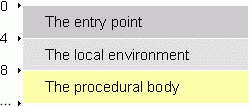- 2.2.12.5. -
Table of Contents

 2. TMT Pascal Language Description
2. TMT Pascal Language Description


 2.2. Pascal Language Structure
2.2. Pascal Language Structure



 2.2.12. Procedures and Functions
2.2.12. Procedures and Functions




 2.2.12.5. Procedural Value
2.2.12.5. Procedural Value
2.2.12.5. Procedural Value
TMT Pascal has a notion of a procedural value. It gives an opportunity to use
procedure or function in a program as a usual simple type object such as
enumerate type or subrange type. One can declare an variable of the procedural
type, make an assignment to it, and invoke the procedure body from.
By default the procedural value implemented in the TMT Pascal occupies 4 bytes
of memory.

It's also possible to declare the extended ("old-style") procedural
values by means of arg_proc_based
calling convention modifier. These procedural values which occupy 8 bytes
of memory and consist of two parts: the entry point to the routine and the
reference to the local environment of the routine (known as a routine base).
A format of the extended procedural value is following:

The first part is needed for calling of the routine. The second part is used
to access the routine variables. Such format of the procedural value is
incompatible with the Borland Pascal format which has only the entry point.
Furthermore, the stack frame structure and parameter passing conventions
differ from those in Borland Pascal.
Thus the approach used in TVision and CLassLib for writing iterations cannot
be used. However, we offer this correct and reliable (and more standard) way:
type
list = object
next: ^list;
procedure for_all(procedure body(var v));
end;
procedure list.for_all;
var
p: ^list;
begin
p := @self;
repeat
body(p);
p := p^.next;
end;
end;
...
type
int_list = object (list)
value: integer;
function first_positive: ^int_list;
end;
function int_list.first_positive;
label OK;
var
res: ^int_list;
procedure do_item(var v);
begin
if int_list (v).value > 0 then
begin
res := @v;
goto OK;
end
end;
begin
res := nil;
for_all(do_item);
OK:
first_positive := res;
end;
...
The procedural value from a method of object can be obtained by selecting
this method from some object value (not from a type). The parameters of this
procedural value must match the parameters of the method. The invocation
of such a procedural value is an invocation of the corresponding method of
the object. The reference to the object is transferred through the base of
the procedural value.
You can use only global procedural values to initialize a type constant.
Procedural values may be used only while the environment where they were
formed is still in existence. Thus,
- for local procedures -- until the exit from the block,
in which they are described;
- for methods -- while the underlying object still exists.
- 2.2.12.5. -










